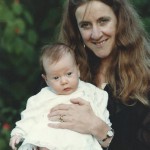The year my father died, I became a mother for the first time. My father came to see me in the hospital, a day after I had given birth. He came with my mother. She had pressured me to give birth sooner than I could simply because she wanted to go away to Canberra to meet with her eldest son.
She and my father had been estranged from this son for years and now it looked as though he would welcome my parents back into his life. The fact that I was about to give birth mattered less to my mother than this opportunity to reconnect with her first-born. It also mattered less to her that my father, whose lungs had collapsed with emphysema, might not manage the journey. They were going and that was that.
I stopped answering my mother’s calls. It annoyed me that she feigned interest in how I was going when in fact all she wanted was to see me birthed. The doctors had given me a due date a week earlier and as each day passed I grew more and more frantic.
When my baby was born at last, and my mother gushed into the ward to see the twelfth of her eventual twenty-three grandchildren, I found the greatest pleasure rested, not in her response to my little girl, but in my father’s.
He sat on a chair near the bed and looked on as my mother bubbled over. He did not ask to hold my baby but gave a big smile when I peeled back the blanket from her face. After only ten minutes, he excused himself. It would take him at least ten minutes to get back to the car park. My mother could stay and talk to me while he made his way out.
I watched him as he struggled along the corridor. Twice, he stopped and sat in a chair propped on one side. Twice, he looked as though he might fall over with the effort. Twice, I watched him draw breath back inside his lungs before he had the strength to move on.
And then he was gone from view.
Nine days later he was dead.
We buried him in the Cheltenham cemetery, behind a fence that led onto a golf course. At one point during the burial, my daughter started to cry and my husband took her away from the people scattered around my father’s open grave.
He decided to lay her out on a flat gravestone so that he could change her nappy. Someone called out over the fence when they heard the sound of a baby. A golfer who was alarmed perhaps that things were not right and my husband reassured him.
‘We’re burying her grandfather.’
And so these two events are cemented together in my memory, birth and death together. The old making way for the new.

